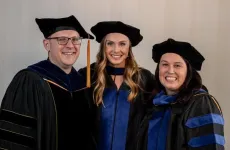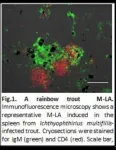Contact
Colleen McDonald - Sr. Consultant, Earned Media
414.801.3146 | cmcdonald@mcw.edu
Milwaukee, Wis. – Dec. 1, 2023 – Preeclampsia is a mysterious condition that occurs in about one of 10 pregnancies without any early warning signs. After 20 weeks or more of normal blood pressure during the pregnancy, patients with preeclampsia will begin to experience elevated blood pressure and may also have increased levels of protein in their urine due to hypertension reducing the filtering power of the kidneys. Prolonged hypertension due to preeclampsia can lead to organ damage and life-threatening complications for mothers and fetuses.
There is no cure for the underlying causes of preeclampsia, so physicians focus on managing and monitoring patients’ blood pressure to allow for as close to a full-term gestation as possible. With severe disease, pre-term deliveries are necessary.
“For some patients who can make it to full term, a preeclampsia diagnosis is scary at first but ultimately a bump in the road,” says Jennifer McIntosh, DO, MS, associate professor of obstetrics and gynecology at the Medical College of Wisconsin (MCW). “For those who get it earlier on, it can be terrifying and life-changing, potentially including a long hospital stay before delivery and significant supportive care for the infant in the NICU afterwards.”
More research is needed into what causes preeclampsia to guide the development of potential new ways to diagnose, treat and prevent this common yet cryptic condition.
“The worldwide incidence of preeclampsia is rising, so research grows more important by the day,” Dr. McIntosh says. “Preeclampsia has existed for as long as women have been giving birth, and yet the only cure for it is delivering the baby. I believe we can be innovative and do better for our patients.”
MCW scientists published results on a study of one of the emerging theories for what causes preeclampsia in Science Advances in December 2023. The experiments focus on a particular layer of cells of the placenta called the syncytiotrophoblast (STB), which is a key part of the barrier between the mother and developing fetus. This blockade helps keep a mother’s fully formed immune system from reacting to the fetus and potentially responding as if the fetus was a foreign threat such as a viral or bacterial invader. The barrier also works in reverse to keep the fetus’s growing immune system from reacting to its mother’s cells and tissues. The study’s authors investigated the hypothesis that an abnormal amount of cellular and molecular stresses to the STB can damage the placenta and lead to preeclampsia.
“There is considerable evidence that these stresses accumulate, however, how and why it happens continues to be an open question,” says Justin Grobe, PhD, MCW professor of physiology and biomedical engineering and the co-corresponding author on the Science Advances manuscript with Dr. McIntosh. “We felt it was important to continue to validate the STB stress findings before advancing work on our hypothesis that elevated hormones of pregnancy contribute to the accumulation of stress by overstimulating the STB.”
The research team began by studying placentas donated for research purposes through the MCW Maternal Research Placenta & Cord Blood Bank. By comparing “normal” placentas with placentas from pregnancies where patients suffered from preeclampsia, investigators demonstrated that preeclampsia was associated with higher levels of cellular stresses in the STB layer on the placenta. Additionally, the researchers found a hyperactive level of activity of the Gαq protein known to play a role in transmitting signals related to the levels of several hormones present in excessive amounts during preeclampsia.
“The donated human placenta samples were critical to identifying potential mechanisms of STB stress,” says Megan Opichka, PhD ’23, research and development scientist at BioSpyder Technologies and first author on the publication. “Because these samples are collected upon delivery, we then needed to develop an animal model to determine if these sources of stress may actually be causative.”
Based on the findings of hyperactive signaling through G-protein-coupled receptors (GPCRs) in samples from patients with preeclampsia, the scientists developed a new mouse model genetically engineered to enable the precise manipulation of GPCR signals within specific cell types. This allowed the researchers to activate the signaling pathways associated with preeclampsia within the STB layer of the mouse’s placenta. The team demonstrated that even a very brief activation of the identified signaling cascades during the early or middle portions of gestation led to significant consequences during the mouse pregnancy. These mice developed all the signature signs of preeclampsia, including high blood pressure, kidney damage and other anatomical and cellular changes. In some mice exposed to the preeclampsia inducing signals, the scientists tested the effects of a medicine that reduces stress on the mitochondria that generate energy within each cell. The drug provided substantial protection against developing the signs and symptoms of preeclampsia.
“With our unique model, we can study the effects of contributing factors to preeclampsia throughout pregnancy,” Dr. Grobe says. “We can test specific signaling cascades in specific cells and tissues at specific times to observe their effects. We have only scratched the surface on what we can learn.”
“This will absolutely be a springboard for future research,” Dr. McIntosh adds. “Because the drug we tested, MitoQ, is generally known to be safe, we’re working on plans for a clinical pilot study to test appropriate dosage and efficacy in advance of pursuing larger clinical studies of preeclampsia in the future.”
So, can preeclampsia be prevented? While today the answer is no, MCW scientists now are one step closer with these experimental results. And they are continuing to work as a team to achieve this goal through additional studies.
“What drives my research is my frustration about the lack of understanding of what causes preeclampsia,” says Dr. McIntosh. “We need to continue linking the bench and the bedside together so that we can understand the causes and use them to bring a cure to the bedside.”
Reference: Megan A. Opichka, M. Christine Livergood, Kirthikaa Balapattabi, McKenzie L. Ritter, Daniel T. Brozoski, Kelsey K. Wackman, Ko-Ting Lu, Kaleigh N. Kozak, Clive Wells, Agnes B. Fogo, Katherine N. Gibson-Corley, Anne E. Kwitek, Curt D. Sigmund, Jennifer J. McIntosh, and Justin L. Grobe. Mitochondrial-Targeted Antioxidant Attenuates Preeclampsia-Like Phenotypes Induced by Syncytiotrophoblast-Specific Gαq Signaling. Science Advances, 1 December 2023
# # #
NOTE: Drs. Grobe, McIntosh and Opichka are available for interviews. To schedule, contact the Medical College of Wisconsin press office at media@mcw.edu.
More information, including a copy of the paper, can be found online at the Science Advances press package at eurekalert.org/press/vancepak/.
About the Medical College of Wisconsin
With a history dating back to 1893, The Medical College of Wisconsin is dedicated to leadership and excellence in education, patient care, research, and community engagement. More than 1,400 students are enrolled in MCW’s medical school and graduate school programs in Milwaukee, Green Bay, and Central Wisconsin. MCW’s School of Pharmacy opened in 2017. A major national research center, MCW is the largest research institution in the Milwaukee metro area and second largest in Wisconsin. In the last 10 years, faculty received more than $1.5 billion in external support for research, teaching, training, and related purposes. This total includes highly competitive research and training awards from the National Institutes of Health (NIH). Annually, MCW faculty direct or collaborate on more than 3,100 research studies, including clinical trials. Additionally, more than 1,600 physicians provide care in virtually every specialty of medicine for more than 2.8 million patients annually.
END







